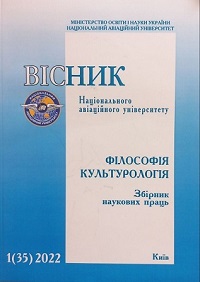АКСІОЛОГІЧНІ ЗАСАДИ ЕКОЛОГІЧНОЇ СВІДОМОСТІ
DOI:
https://doi.org/10.18372/2412-2157.35.16561Ключові слова:
екологічна свідомість, екологічна культура, екологічна етика, цінності духовні, відповідальність, спільносвітАнотація
У статті здійснюється аналіз й обґрунтування аксіологічних засад екологічної свідомості як засадничого
й визначального складника екологічної культури особистості і суспільства, уточнюється поняття «екологічна
свідомість». Проаналізовано ті цінності-концепти, які в сучасних умовах буття постіндустріального суспільства
виходять на перший план і мають сприяти формуванню сучасної екологічної культури людини глобалізованого світу,
виконувати організуючу функцію у систематизації знань, навичок, цілей людської діяльності в реальному процесі
гармонізації відносин «людина - природа - суспільство».
Посилання
Єрмоленко А. М. Соціальна етика та екологія. Гідність людини – шанування природи: монографія / А. М. Єрмоленко. – К.: Лібра. 2010. – 416 с.
Йонас Г. Принцип відповідальності. У пошуках етики для технологічної цивілізації / Г. Йонас – К.: Лібра. 2001. – 400 с. 3. Кисельов М. М. Екологічна свідомість як феномен освітянського процесу / М. М. Кисельов // Філософська думка. – 2005. – №5. – С. 130-149.
Кисельов М. М. Екологічні виклики на межі тисячоліть / М. М. Кисельов. // Філософська думка. – 2006. – №2. – С. 101-118.
Кисельов М. М. Мораль і право в екологічній етиці / М. М. Кисельов // Практична філософія. – 2017. – №4. – С. 3-9.
Кисельов М. М. Феномен життя у сучасному філософському дискурсі: монографія / М. М. Кисельов, Т. В. Гардашук, Ю. А. Іщенко, С. І. Грабовський. – Ніжин: Видавець ПП Лисенко М.М. – 2018. – 296 с.
Клешня Г. М. Роль традиційних цінностей культури у суспільному розвитку інформаційної доби / Г. М. Клешня // Вісник Національного авіаційного університету. Серія: Філософія. Культурологія: Збірник наукових праць. – Вип. 1 (29). – К.: НАУ, 2021. – С. 135-141.
Костенко Л. Україна як жертва і чинник глобалізації катастроф / Л. Костенко // Буковина. – 2004. – 4 вересня.
Маєр-Абіх К. М. Повстання на захист природи. Від довкіля до спільно світу / К. М. Маєр-Абіх. – К.: Лібра. 2004. – 196 с.
Малахов В. А. Етика: Курс лекцій / В. А. Малахов – К.: Либідь. 1996. – 304с.
Малахов В. А. Мораль на межі людського: виклики сьогодення / В. А. Малахов // Цивілізаційні виміри моральності: Зміна парадигми. Проект «Наукова книга». – К.: Наукова думка. 2007. – С. 3-40.
Мокляк Л. І. Природа як духовна цінність у становленні культури сучасного українського суспільства / Л. І. Мокляк, Г. М. Покотило // Вісник Національного авіаційного університету. Серія: Філософія. Культурологія: Збірник наукових праць. – Вип. 2 (22). – К.: НАУ, 2015. – С. 135-140.
Скиба О. П. Екологічна культура як складова духовності сучасної людини / О. П. Скиба // Вісник Національного авіаційного університету. Серія: Філософія. Культурологія: Збірник наукових праць. – Вип. 1 (33). – К.: НАУ, 2021. – С. 146-149.
Федотов Г. П. Святые древней Руси (X-XVII ст.) / Г.П. Федотов. – Paris: YMCA-PRESS. 1989.
Фромм Э. Душа человека / Э. Фромм. – М.: Республика. 1992. – 430 с.
Everden L. L.N. The Natural Alien: Humankind and Environment / L. L.N Everden. – Toronto: University of Toronto Press, 1995.
Naess A. Ecology, Community and Lifestyle / Naess A. – New-York, 1989.
Downloads
Опубліковано
Версії
- 2023-07-20 (2)
- 2022-08-12 (1)


